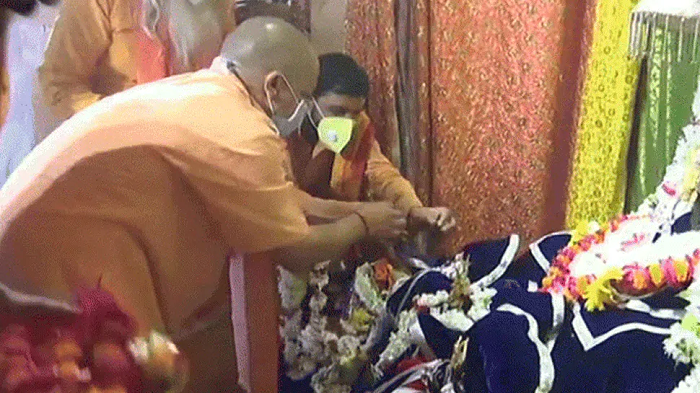New Delhi, Jan 4: The high-stakes assembly elections in Uttar Pradesh will be held in seven phases between February 11 and March 8, while Punjab and Goa will go to polls together on February 4, Uttarakhand on February 15 and Manipur in two phases on March 4 and 8, with counting to be held on March 11.
 Announcing the poll schedule for five states, Chief Election Commissioner Nasim Zaidi said the seven-phased UP Assembly polls for 403 constituencies will be held on February 11, 15, 19, 23, 27, March 4 and 8.
Announcing the poll schedule for five states, Chief Election Commissioner Nasim Zaidi said the seven-phased UP Assembly polls for 403 constituencies will be held on February 11, 15, 19, 23, 27, March 4 and 8.
He said over 16 crore people will participate in these polls for a total of 690 constituencies in five states, for which the Commission has set up 1.85 lakh polling stations, which are 15 per cent more than those set up in 2012 polls.
The CEC flanked by the two Election Commissioners A K Joti and O P Rawat announced that the poll process will commence with the issue of notification on January 11 for Punjab and Goa polls where candidates can start filing their nominations.
"The Model Code of Conduct will come into immediate effect and will apply on political parties and state governments concerned, besides the Central government in terms of announcements in these states," Zaidi told reporters.
The CEC said candidates will have to open a fresh bank account for all election expenses and all expenses above Rs 20,000 will be made through cheques from their respective accounts. He added that all donations will also be accepted through cheques.
The maximum limit for expenses for each candidates in Uttar Pradesh, Punjab and Uttarakhand is Rs 28 lakh, while that in Goa and Manipur is Rs 20 lakh, he said.
The first phase of Uttar Pradesh Assembly elections covering 73 constituencies in 15 districts will be held on February 11, while 67 constituencies spread over 11 districts will go to polls on February 15 in Phase II.
Similarly, for Phase III covering 69 constituencies in 12 districts of the states, polls will be held on February 19 and Phase IV and Phase V will be held on February 23 and February 27, covering 53 and 52 constituencies respectively.
Phase VI of UP polls covering 49 will be held on March 4 and the last phase covering 40 seats will be held on March 8.
The assembly polls in Punjab and Goa with 117 and 40 constituencies respectively, will be held in one go on February 4, with the poll process being set rolling on January 11 with the filing of nominations.
Uttarakhand with 70 assembly constituencies will go to polls in one go on February 15, while Manipur will have polling in two phases on March 4 and 8.
The poll process will start in Uttarakhand on January 20, while that for Manipur will commence on February 11 with the issue of notification, where the nominations will start.
Zaidi said the use of black money in these elections is expected to reduce post demonetisation, but use of other illegal inducements in different forms may see an increase.
He said for the first time the EC will issue Standard Operating Procedures for the first 72 hours of poll process after announcement of polls and for the last 72 hours before polling to ensure that the poll machinery is set rolling and activated.
The EC has also for the first time made it mandatory for every candidate contesting these polls to file another affidavit in the form of a "No demand certificate" declaring any pending electricity, water, telephone bills and rent for government accommodation in their possession in last ten years.
The CEC said candidates will also make a declaration while filing their nominations on their being a citizen of India and having not possessed citizenship of any other country.
The affidavit is in compliance with a Delhi High Court ruling in this regard and failure to file it will lead to defects of substantial nature during scrutiny of nomination papers, Zaidi said.
As part of another first of its kind initiative, the EC will accept online the service votes of defence, para-military personnel and those posted in missions abroad. This comes after the success of an experiment in Puducherry.
Zaidi said VVPAT machines will be used in increasing number in select areas during these assembly polls and Goa will be saturated with VVPAT.
While Electronic Voting Machines will be used in all polling stations, the ballot paper on EVM machines will for the first time carry photographs of candidates along with their names and poll symbols.
The Commission will issue photo voter slips to voters ahead of polls and will for the first time also distribute a colourful booklet that will guide the voters on date and time of polls and location of polling stations, besides Dos and Don'ts for them.
To encourage more participation of women in election management, the EC will also have some all-woman polling stations this time around, besides making all polling stations disabilities-friendly.
The tenure of Punjab, Goa and Manipur assemblies are ending on March 18, while that of Uttarakhand will end on March 26 and Uttar Pradesh Assembly on May 27.
Of the total 690 constituencies going to polls in these five states, 133 are reserved for Scheduled Castes and 23 for Scheduled Tribes.






Comments
Abki baar say no to Fenku Sarkaar..
Add new comment